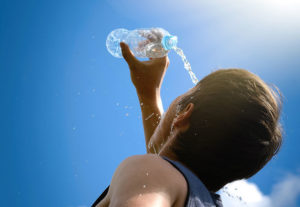The high summer temperatures of South Florida bring hazards. Being aware and taking appropriate precautions will prevent serious health issues, and help you enjoy the summer in a carefree manner.
Hydration isn’t just important during physical activity. When the temperatures rise, getting enough to drink is important whether you’re playing sports, traveling or just sitting in the sun. Being exposed to the sun or humidity even if you aren’t exercising, can cause your body to need more fluids.
Dehydration
Dehydration can be a serious condition that can lead to problems ranging from swollen feet and headaches to life-threatening illnesses such as heat stroke.
The human body is composed of more than 50% water, which plays an integral role in many bodily functions necessary to sustain life. Adequate water is vital for digestion and organ function.
One of the most serious hazards of summer is dehydration, where the body can lose water at an alarming and dangerous rate. Dehydration causes heat exhaustion and other serious heat-related illnesses. In addition, dehydration can wreak havoc on your electrolytes, causing dangerously low levels of sodium and potassium in your body.
The first thing to ensure during summer is pre-hydrating our bodies, drinking and rehydrating adequately before, during and after any activity.
Water is Critical for Your Heart Health
A well-hydrated body keeps the heart pumping blood through the blood vessels to the muscles more easily. And it helps the muscles work efficiently and ensures the heart doesn’t have to work so hard.
People who have a heart condition, are older than 50 or overweight may also have to take extra precautions when dealing with the summer heat.
Symptoms of Dehydration
If you have become thirsty your body has already lost 1-2% of its fluids, about 1-2 liters of body water.
Here are some signs of dehydration:
· Fatigue
· Loss of appetite
· Flushed skin
· Chills
· Heat intolerance
· Light-headedness
· Dark colored urine
· Dry cough
· Headaches
· Muscle cramping
· Tingling in extremities
· Inability to sweat
Emergency medical attention should be given to those suffering from the more severe symptoms.
How Much Water Do We Lose?
Weighing yourself before and after an activity (without clothes), and subtracting the difference gives a good estimate of fluid loss. More than 1% loss in body weight indicates dehydration while over 5% indicates severe dehydration.
Well-Hydrated -1 to +1%
Minimal Dehydration -1 to -3%
Significant Dehydration -3 to -5%
Serious Dehydration >5%
How Much Water Do You Need?
The amount of water a person needs depends on climatic conditions, clothing, activity, and duration.
Those who perspire heavily need more fluids. Medical conditions such as diabetes or heart disease require more water. Cystic fibrosis sufferers have high concentrations of sodium in their sweat, and need to avoid dehydration. Some medications act as diuretics, causing more fluid loss.
Thirst alone is not an accurate symptom, the color of your urine is. Pale and clear signals adequate hydration. The darker it is, the higher the level of dehydration.
Inability to sweat while engaged in vigorous physical activity can be a red flag, pointing to dehydration, to the point of imminent heat exhaustion.
A good guide to hydration is:
16-32 ounces before vigorous activity.
16-20 ounces every 10-15 minutes during activity.
20 ounces for every pound of body weight lost during activity.
Healthy Hydration
Alcohol and carbonated beverages should be consumed in moderation, as the body does not tolerate them well especially in the heat and sun. It is best to hydrate with alternating water with the occasional sports drink, to replace chemicals such as sodium and potassium, as well as fluids.
Fruit juices, sodas or sugary drinks can be hard on the stomach if you’re dehydrated. Avoid drinks containing caffeine, which acts as a diuretic and causes more fluid loss.
Water is best to stay hydrated, as it is sugar and calorie-free. Sources of water also include highly water-rich fruits and vegetables like watermelons, cucumbers, and strawberries.
Preventing Dehydration this Summer
Dehydration can become a serious problem. Staying hydrated and drinking enough water is vital for digestion and organ functions. The following steps should help:
Exercising: hot, humid conditions can dehydrate a person in 30 to 60 minutes. Outdoor activities should be done during the cooler parts of day, before 10 am or after 4 pm. Sunscreen with minimum SPF 15 should be used. Stay out of the sun and wear a hat and sunglasses.
Hydration: thirst indicates dehydration. Hydrate yourself before, during and after any activity.
Salt: salty snacks help rehydration during lengthy or intensive workouts. If you lose 2 to 5 percent body weight, take a salt replacement. With moderate exercise, under one hour, normal salt intake with food is sufficient.
Water: over-drinking water during a workout can cause symptoms ranging from nausea to coma. The International Marathon Medical Directors Association recommends that athletes drink 31 ounces of water an hour, rehydrating every 20 minutes.
Acclimating: newcomers not used to the sweltering Florida sun, should limit their sun exposure and activity and get their bodies adjusted slowly over the course of two weeks. Get used to sweating, then cooling down, and practice hydration.
If you think you might be dehydrated, or to learn more about staying safe this summer, call Advanced Medical in Wellington and Royal Palm Beach, Florida at (561) 434-1935 to request an appointment, or you can request an appointment online.



